Summary:
- JinkoSolar is the largest solar PV and module manufacturing company, with module shipments reaching 21.4 GW in Q3 2023.
- The company has a competitive advantage in technology innovation, global distribution network, and vertical integration of supply chains.
- JKS could reap the benefits of an expanding solar market both in China and globally.
- With its Forward PE trading at 3x and a P/S of 0.11x, this could suggest that JKS is deeply discounted and overlooked by investors.
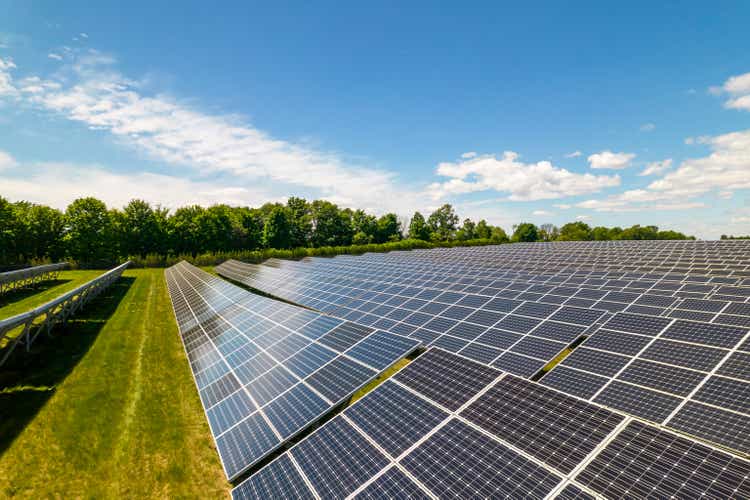
tigerstrawberry
Investment Thesis
Solar Stocks haven’t enjoyed a great run lately, partly due to investors’ fear for the “Higher for Longer” interest rate backdrop and uncertainties regarding slowing economic growth in 2024 in the US and Europe, which has resulted in mounting pessimism for the outlook of the solar sector, as the cost of financing solar modules installation has become more elevated and expensive. As a result, most solar companies have seen their inventories piling up with lower backlog orders as production outpaces installation. This has resulted in much disdain from Wall Street and investors, causing a massive sell-off across the broad market.
Nevertheless, JinkoSolar (NYSE:JKS) was the outlier of all. Despite the cyclical slowdown of the solar market, JKS still delivered a robust quarter in Q3 2023. Revenue was $4.36 billion in Q3 2023, up 63% YoY. Diluted EPS increased by 188.7% YoY to $0.63, and the gross margin expanded from 15.7% to 19.3%.
This promising YoY growth was mainly attributable to the increases in the shipment of solar modules. Total module shipments were up approximately 21.4 gigawatts, an increase of 107.9% year over year. With the expansion of its N-Type Wafer Solar Modules Production Facilities in Shanxi, China will set to commence production in 2024, adding an incremental production capacity of 28GW.
Jinko has some main competitive advantages that include its large production capacity, global network, high energy conversion modules, and constant technology innovation. Meanwhile, Jinko’s long-term prospect remains bright, that will likely benefit from the Inflation Reduction Act in the US, and low carbon energy transition efforts both in China and EU, which raises downstream and solar installation demand.
Given its solid financials and unreasonably low valuations (3x PE), JKS has the potential to outperform the market in the long-term, I rate JKS as a “Strong Buy”.
Business Overview
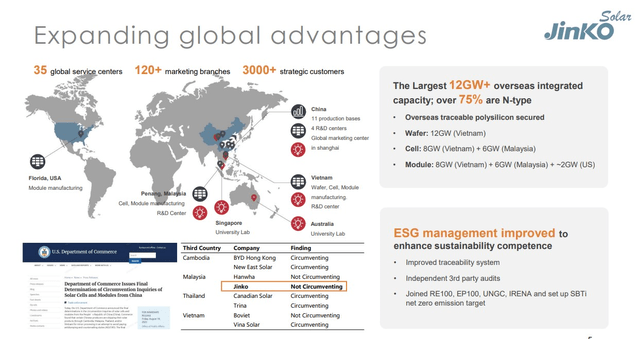
Jinko Business Overview (Investors Presentation)
JinkoSolar (JKS) is a Chinese Solar Company founded since 2006 that engages in the design, development, production, and marketing of photovoltaic (PV) products. The company offers solar modules, silicon wafers, solar cells, recovered silicon materials, and silicon ingots. It also provides solar system integration services; and develops commercial solar power projects.
JinkoSolar has extensive business operations in the People’s Republic of China, the United States, Mexico, Australia, Japan, Vietnam, and EU. The company produces Wafer Solar Modules primarily in its production facility in China, Vietnam, Malaysia and Jacksonville, Florida.
JinkoSolar manufactures two types of Solar Modules, including the P-Type and N-Type (Higher Energy Conversion Rates and Power Outputs)
Leadership in Cutting-edge N-Type Technology
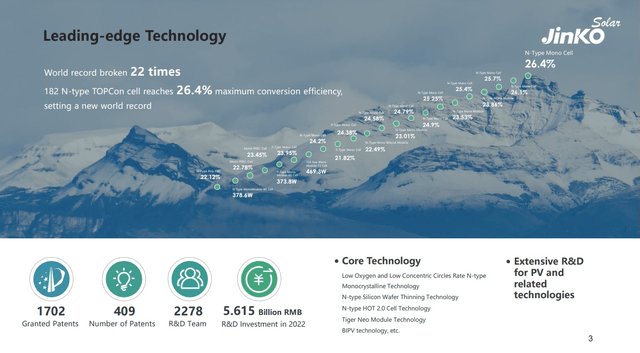
Solar Tech Advancement (JKS Investors Presentation)
One of the major competitive advantages that JinkoSolar differentiates itself from its competitors is the cutting-edge and industry leading N-type TOPCon cells technology it possesses. The energy conversion rate of its N-Type Wafer Solar Cells has been improving gradually, hitting a world record of 26.4% in Q2 2023 and 26.89% in Q3 2023 in terms of maximum Lab conversion efficiency, whereas mass production efficiency reached 25.6%.
This remains marginally higher than its competitors like First Solar (FSLR), Daqo New Energy (DQ), and Canadian Solar (CSIQ), which has panel efficiency of 22-23% on average. Looking forward, energy conversion rate for Jinko’s N-type solar cells is expected to hit 27% in 2024, which indicates the strong technological moat that Jinko possesses.
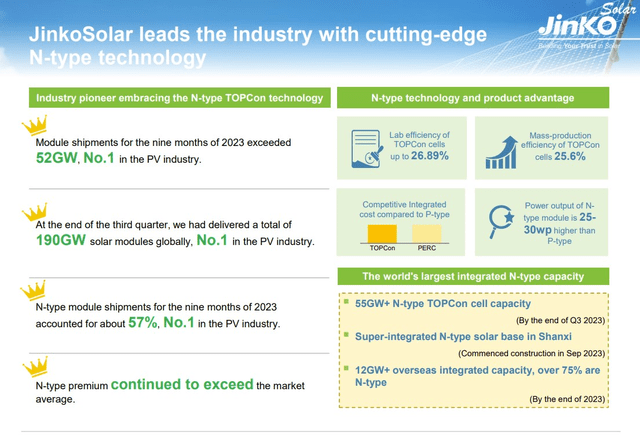
Jinko Solar N-Type Technology (Q3 2023 Investors Presentation)
Furthermore, JinkoSolar also delivered 52 GW in Module Shipments for its N-Type TopCon Solar Modules, which accounts for 57% of N-Type Module Shipments in the solar industry. This places JinkoSolar 1st globally in terms of Solar Module shipment delivery, reflecting its prime position and its ability to exceed the market averages.
JinkoSolar will likely retain its dominant and industry leading position in the Solar Sector given its strong commitment to product leadership and R&D development. In fact, JKS now owns more than 400 patents for its proprietary technologies. This makes it formidable for its competitors to copy and creates an economic moat around the business.
Widespread Popularity of Tiger Neo Solar Panels
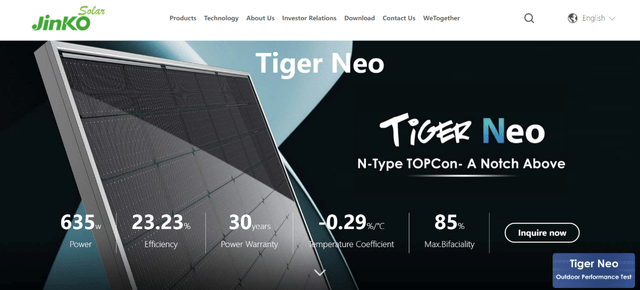
Tiger Neo Solar Module (Jinko Solar Website )
See we can see, Jinko has recently launched its latest product Tiger Neo Solar Modules using its proprietary N-Type TOPCon solar cell technology, which produces 635w of Power with an energy conversion efficiency of 23.23% and has outperformed its predecessor – Tiger Pro Solar Module – which has a power output of 585w and energy conversion rate of 21.4%. This manifests the fact that T-type cell technology delivers 25~30Wp more than P-type solar modules.
In fact, Tiger Neo has recently gained recognition globally with greater market penetration, especially in China, the Middle East, and APAC regions. For one, JKS won the bid to provide 3.2GW N-type modules for China’s CHN Energy Investment Group projects for National Energy Transition projects. For another, Jinko signed a 3.8GW module supply agreement of N-type Tiger Neo with Saudi Arabia Utilities Company – ACWA Power. This manifests the robust product demand for JKS’ N-Type Products. Currently, N-type products accounts for 60% of module shipments globally in Q3 2023.
Enhanced Production Capacity
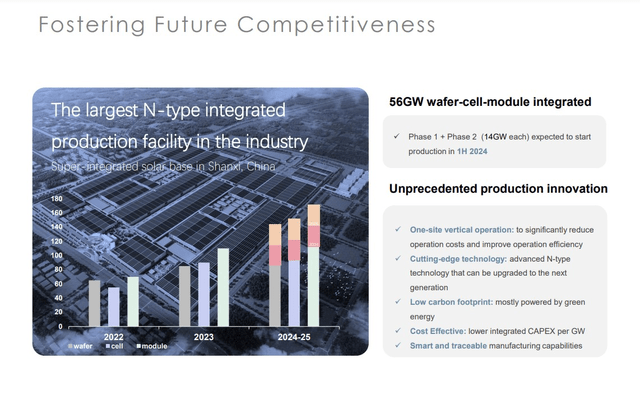
Shanxi Production Plant (Investors Presentation)
By the end of Q3 2023, JKS already had over 55GW of N-type cell production capacity. And by the end of this year, N-type cell production capacity is expected to reach about 70GW, a competitive capacity structure leading the industry.
Jinko has recently started construction for integrated projects in Shanxi, China, for Phase 1 and Phase 2 to address the rising demand for its solar modules. Combined, a total of 28 GW wafer cell and module integrated capacity are expected to start production in the first half of 2024. Furthermore, wafer and module overseas production is expected to ramp up in 2024, adding an incremental 12GW of production capacity (US Florida: 2GW). 75% of overseas capacity would be used to produce N-type solar Cell Technologies
With expanding production facilities, I think that Jinko can easily raise its global module shipments capacity in 2024, thus bringing in more revenue and cash flow to the firm.
Robust Global Distribution Network
While Jinko has a wide distribution network not only in China, but also has operations in the US, Europe, Middle East, and ASEAN regions. Its upstream (Polysilicon Supply) and downstream supply chains is well diversified globally.
At the end of Q3 2023, Jinko became the world’s first module manufacturer to have delivered 190GW solar modules, covering over 190 countries and regions. In Q3 alone, shipments were 22,597 MW (21,384 MW for solar modules, and 1,213 MW for cells and wafers), up 21.4% QoQ, and up 108.2% YoY.
Management team even promised shareholders that annual module shipments in 2023 will exceed its previous targets of 70-75GW, and 23 GW alone for Q4 2023. This shall be good news for shareholders given the company has already delivered more than one-third of historical shipments in 2023 alone. I think that this reflects the astonishing production volume and strong demand for its solar panels.
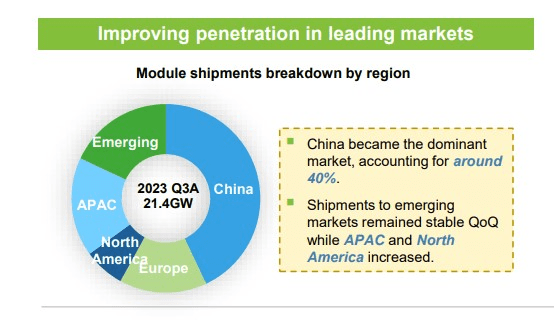
JKS Geographical Module Shipment Breakdown (Q3 2023 Investors Presentation)
Currently, China takes up 40% of module shipments, which remains to be the largest market for JinkoSolar. Meanwhile, the management expect a new installation record in China this year given the wider renewable energy adoption trend in China. We will also likely see an increasing demand in the US market thanks to the
Inflation Reduction Act (IRA), which involves the U.S. Government giving US citizens subsidies to purchase solar panels. Growing solar demand in Saudi Arabia and MENA is also expected to support energy transition. This will likely open up more business opportunities and total addressable market (TAM) for Jinko in the future, thus bringing in more revenue and cash flow to the business amidst the solar transition in the future.
Industry tailwind: Growing renewable energy transition demand in China
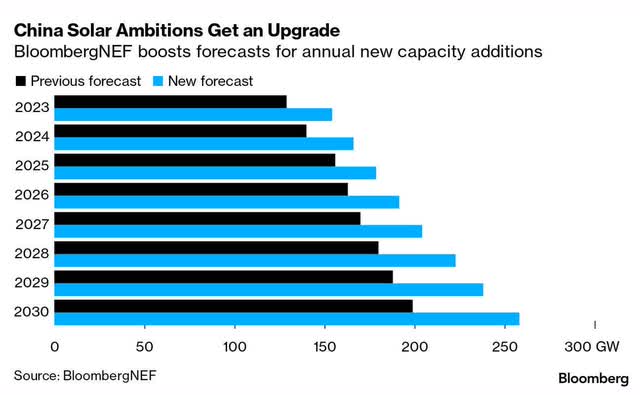
China Solar Sector New Capacity Additions (Bloomberg NEF)
According to Rystad Energy, China’s solar capacity expected to hit 1,000 GW by 2026. And China had already installed 365 GW of wind power capacity and 392 GW of solar capacity by the end of last year – about a third of the world’s total. The country’s installed capacity is expected to top 500 GW by the end of 2023.
Meanwhile, Bloomberg Estimates that China will see 175-200GW of new solar capacity additions in 2025-26 alone in China. Thanks to the Chinese government’s 14th 5-year Plan, substantial subsidies, tax incentives, and favourable policies have been provided to encourage the growth of solar power. These policies created a conducive environment for innovation and investment, positioning China as the global solar technology, production, and deployment leader. It offers a favourable backdrop for Jinko to continue its solar module shipments and installation in China, which provides a huge addressable market for Jinko to exploit.
Furthermore, China will likely enter a period of consolidation for its solar industry in 2024, which would see its Tier 2 and Tier 3 local solar manufacturers dissipate thanks to the declining ASP of solar modules for an increase in production output. This would allow mega players like Jinko to capture their market share and remain dominant in the Chinese and global market fields.
Financial Analysis
1. Decent revenue and margins
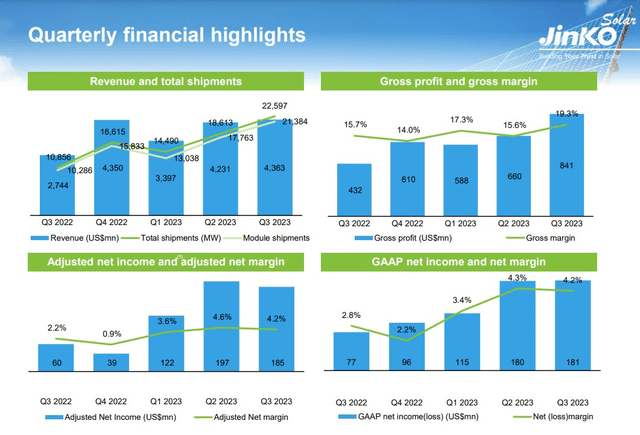
JKS Financials (Q3 2023 Investors Presentation)
Overall, Q3 2023 has been a fruitful quarter for JinkoSolar. Total revenues were US$4.36 bn, up 3.7% QoQ and up 63.1% YoY, compared to US $2.74bn in Q3 2022. We have also seen great margin expansions, which has seen 360 bps (3.6%) YoY expansion from 15.7% in Q3 2022 to 19.3% in Q3 2023. This is surprising given the intense competition and the declining price of solar wavers. Nevertheless, I think this reflects the cost discipline and synergies created by its vertical integration model, which has seen Jinko securing cheap supplies of Polysilicon from its suppliers from the US and Germany through its strategic investments in them.
Additionally, Net income was US$181.4 Mn, up 140.7% YoY, while Net Margins expanded 2% (200 bps) from 2.2% in Q3 2022 to 4.2% in Q3 2023.
While Investors are worried about the possible cut-throat competition in the market, the management team reiterated their stance not to cut its Average Selling Price (ASP) easily during a Bloomberg Interview despite the growing production competition. This shall preserve margins for Jinko in the coming years. Looking forward, with more solar module shipments expected and prudent cost management, this shall catalyze top-line and bottom-line growth.
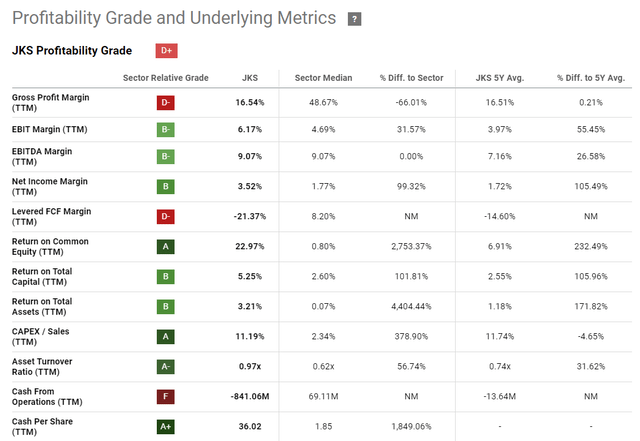
JKS Profitability Grade (Seeking Alpha)
While I disagree with Seeking Alpha’s rating for Jinko’s profitability score as a D+, as I think that’s too harsh, its ROE reached 22.97%, which is impressive. Another thing worth considering is its negative free cash flow margin, which could be a potential risk for the business.
2. Balance Sheet Analysis
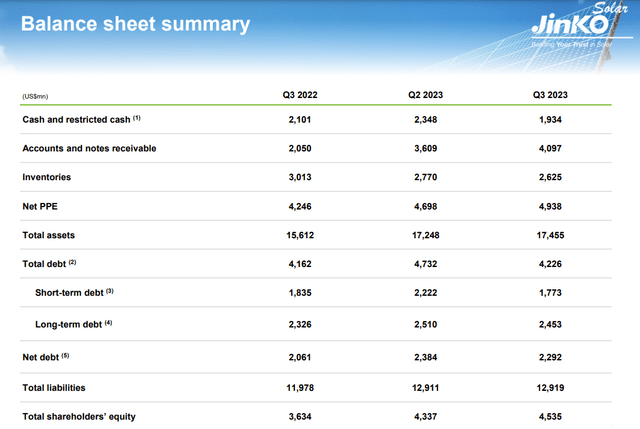
JKS Balance Sheet (Q3 2023 Investors Presentation)
Granted, JinkoSolar’s Balance Sheet wasn’t the most impressive one that I have seen. Jinko had Cash and short-term restricted cash of US$1.93 bn as of end of Q3 2023 vs US$2.35 bn as of end of Q2 2023, representing a fall in cash level of US $42Mn in the space of one quarter largely due to dividend payouts. While Net Debt reached US $2.29 Bn, EBIDTA amounted to US $607.4 Mn, this gives Jinko a Net Debt/EBIDTA ratio of around 3.77x, which may look a bit shaky and risky.
Meanwhile, Current ratio sits at 1.1x as of Q3 2023. This implies Jinko doesn’t have the risk of going bankrupt imminently. Whereas Debt to Equity Ratio is 0.93x, which sits healthily below 1x. This reflects the debt burden may look manageable for JinkoSolar. Hopefully, more deleveraging campaigns would be launched by management team to maximize shareholders’ long-term value and minimize external leverage dependence.
Nevertheless, the great news for shareholders is that the management team was willing to use its cash to distribute dividends. In Sep 2023, the management announced a $1.5 dividend/share payout to shareholders, which has an ex-dividend date on 24th Nov and a distribution date on 6th Dec.
I think this illustrates that the management team acknowledges and rewards shareholders. However, I think share buybacks and repurchase program launches in the future would further add value to shareholders over the long run.
Financial Valuation: Undervalued
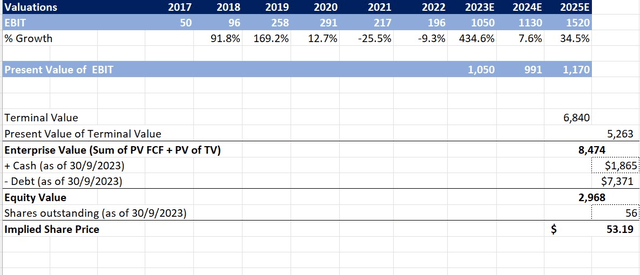
Valuations (KL Research)
Since the company does not produce positive FCF, I would use EV/EBIT (fwd) as my valuation tool.
Based on Analysts’ estimates, JKS’s EBIT is expected to be around $1.05B, $1.13B and $1.52B for this year, 2024 and 2025 respectively.
While JKS is now trading at an EV/EBIT multiple of 7.5x, I tend to be super conservative and value JKS at an EV/EBIT Multiple of 4.5x, given the rising solar competition in China. This gives JKS an Enterprise Value of around $8.47B. By adding back $1.87B worth of cash and subtracting $7.37B worth of debt. I have arrived at an implied equity value for JKS of $2.97B
Dividing it by the number of weighted average shares of 56 million, I have arrived an estimated fair value for JKS at around $53.19/share, implying a potential 66% upside.
To provide another perspective, Morningstar values JKS at an estimated intrinsic value of around $66/share.
This suggests a decent potential upside for JKS! Seems like Mr Market is discounting JinkoSolar by a substantial margin.
Multiples Valuation: Dirt Cheap
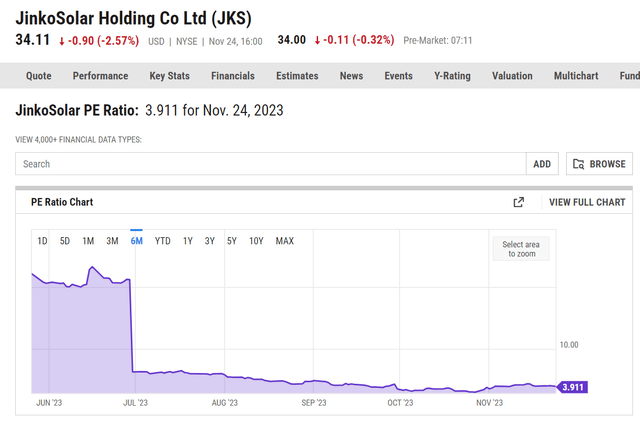
JKS PE (YCharts)
As we can see, JinkoSolar (JKS) is now trading at a deep discount, with its P/E ratio trending downwards and is now trading at nearly 3 – 4x earnings, which remains well below its competitors like First Solar (FSLR) and Enphase Energy (ENPH) of around 25 – 35 x. Perhaps JKS is a typical Ben Graham-style cigar-butt-style Deep Value play.
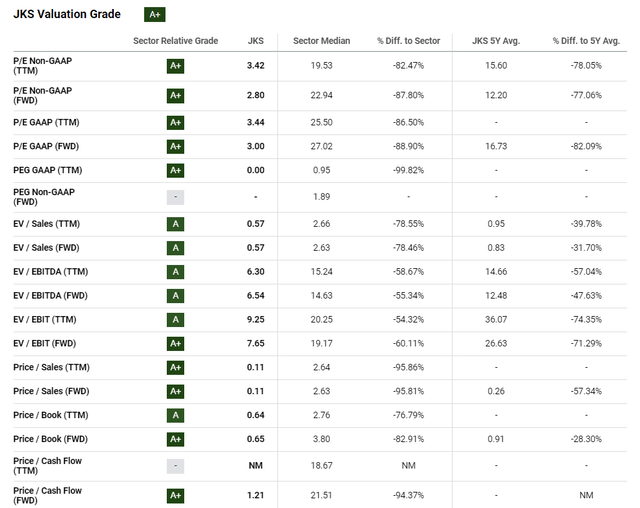
JKS Valuation Grade (Seeking Alpha)
Furthermore, it’s still trading at a huge discount in all multiples relative to its peers. For example, it is trading at a whopping P/B multiple of just 0.64x book value and 0.7x tangible book value, which has a book value (BV) per share of $53.2 and tangible book value (TBV) per share of $48.4 according to Seeking Alpha.
In addition, its P/Cash Flow ratio sits at a whopping 1.21x, which doesn’t really make much sense at all. Apparently, investors and Mr. Market are deeply discounting the upside potential of this stock, and the stocks look extremely undervalued, which provides a golden buying opportunity for investors seeking to gain some exposure to deep value play.
Potential Risks
Despite its solid financials and underappreciated valuation, there are still some underlying risks behind the business that are worth considering before you invest.
1. Dwindling Solar Modules Prices
First of all, the excessive supply and production of Solar Modules and Cells in China has led to a massive drop in the ASP of solar panels. As a result, most investors are worried about the potential “Race to the Bottom Price War” and margin contraction of solar companies in China, which would in turn undermine the long-term profitability of JKS.
While it’s true that most Chinese small solar manufacturer will be driven out of business, this will not be the case of Jinko. Jinko leverages its competitive advantage of having economies of scale in its production, this will only lead to a period of consolidation, where Jinko remains well-positioned to take market share from small businesses who couldn’t compete at a low price. Combined with its integrated vertical production synergies, growing solar modules shipment and industry-leading solar technologies, I am confident that JinkoSolar will navigate through the short-term headwinds.
2. Escalating US – China Geopolitical Tensions
While its noteworthy that the elevated geopolitical tensions and increasing economic fragmentation between China and the US will likely hamper JinkoSolar’s potential development. For instance, JKS got scrutinized by the US Government. The U.S. Department of Homeland Security this year raided a factory and sales office operated by Jinko in Florida. This reflects the growing distrust between US and China, and Jinko, lamentably, will be the scapegoat of it.
Nevertheless, despite its geopolitical headwinds, Jinko will likely continue to expand in the US market. Under the Inflation Reduction Act proposed by the US Government, Solar Companies can enjoy tax credits for solar manufacturing, whereas US citizens will enjoy subsidies for solar modules installation. This will likely create more downstream demand for Jinko for its solar modules’ shipment in the US.
Meanwhile, Solar Cells and Modules produced by Jinko are not subjected to US high tariffs as most of them are made either in the US locally (Florida), Malaysia and Vietnam. This gives JKS a pricing and cost edge compared to its competitors in the US Market.
Conclusion
Upon researching the company’s fundamentals, I think that JinkoSolar (JKS) is a Ben Graham Style Deep Value play that apparently remains well-positioned for future growth, thanks to the global renewable energy transition, industry consolidation, advanced cutting-edge technologies, and diversified foreign business operations. I also love the fact that the company enjoys secular growth and expansion on its revenue and margins over time.
Given its trading at a heavily discounted P/E multiple of 3x, with triple digits upside potential based on the ownership stake in its Chinese subsidiary company, I rate JinkoSolar (JKS) as a decent “Strong Buy”, offering a strong risk to reward perspective.
Analyst’s Disclosure: I/we have no stock, option or similar derivative position in any of the companies mentioned, but may initiate a beneficial Long position through a purchase of the stock, or the purchase of call options or similar derivatives in JKS over the next 72 hours. I wrote this article myself, and it expresses my own opinions. I am not receiving compensation for it (other than from Seeking Alpha). I have no business relationship with any company whose stock is mentioned in this article.
Seeking Alpha’s Disclosure: Past performance is no guarantee of future results. No recommendation or advice is being given as to whether any investment is suitable for a particular investor. Any views or opinions expressed above may not reflect those of Seeking Alpha as a whole. Seeking Alpha is not a licensed securities dealer, broker or US investment adviser or investment bank. Our analysts are third party authors that include both professional investors and individual investors who may not be licensed or certified by any institute or regulatory body.
